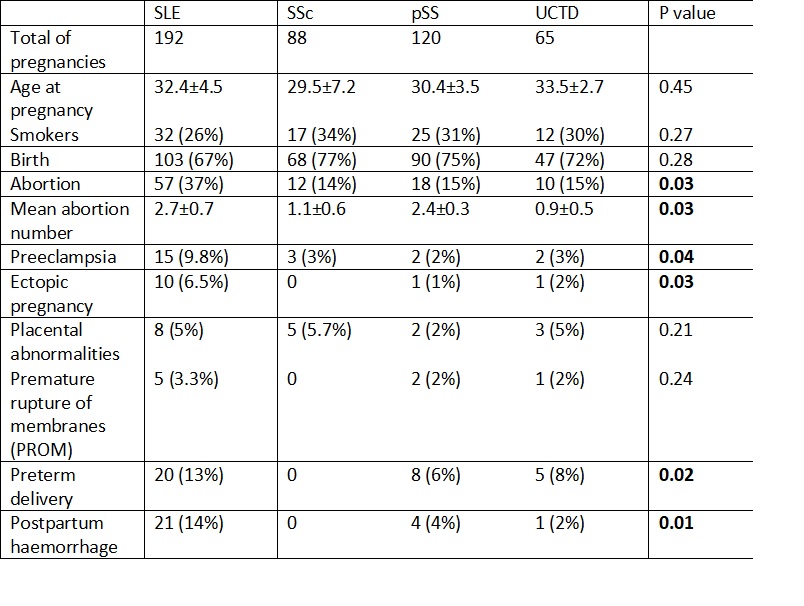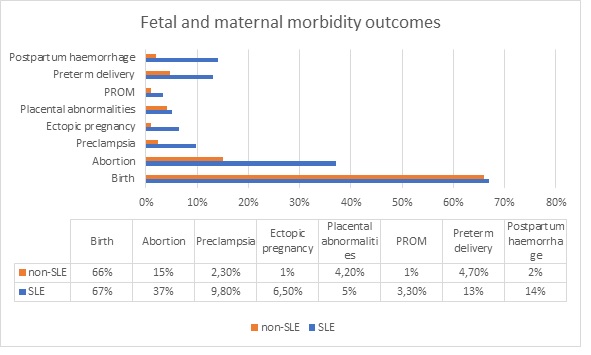Session Information
Date: Tuesday, November 14, 2023
Title: (2257–2325) SLE – Diagnosis, Manifestations, & Outcomes Poster III
Session Type: Poster Session C
Session Time: 9:00AM-11:00AM
Background/Purpose: Pregnancy in patients with connective tissue diseases are known to be at high risk for the occurrence of adverse pregnancy outcomes. We aim toevaluate the pregnancy outcomes in patients with systemic autoimmune diseases, including systemic lupus erythematosus (SLE), systemic sclerosis (SSc), primary Sjögren’s syndrome (pSS) and undifferentiated connective tissue disease (UCTD).
Methods: A retrospective and descriptive study was conducted from 1990 to 2020. All data were collected from the medical records of childbearing age women with SLE, SSc, SS and UTCD enrolled in our clinic at the time of their pregnancy and childbirth. The obstetric, maternal and fetal outcomes were collected and compared regarding diagnosis and adverse outcomes.
Results: The study group included 295 patients, 125 patients (42%) with SLE, 50 patients (17%) with SSc, 80 patients (27%) with Sjogren’s, 40 patients (14%) with UCTD.A total of 465 pregnancies were registered. The maternal and fetal outcomes are detailed in table 1 and figure 1. The mean age at delivery was 31.5±8.5 years and the mean duration of disease was 7.2±5.6 years. Pregnancy loss occurred in 21% of patients, live births in 66% of pregnancies, preterm delivery in 8%, postpartum haemorrhage in 6%, preeclampsia in 5%, placental abnormalities in 4%, ectopic pregnancy in 3%, premature rupture of membranes in 2%.Treatment with HCQ was received in 115 pregnancies in SLE (59%), 21 pregnancies in SSc (24%) 62 pregnancies in pSS (52%) and 32 pregnancies in UCTD (49%). Exposure to corticosteroids and biologics during pregnancy was 23 (18.4%), 6 (12%), 15 (19%) and 3 (7.5%), respectively. Patients with SLE had a higher risk of fetal morbidity, including abortion (p=0.03), mean abortion rate (p=0.03), preeclampsia (p=0.04), ectopic pregnancy (p=0.03), preterm delivery (p=0.02) and postpartum haemorrhage (p=0.01) than patients without SLE. The multivariate model adjusted for age, nulliparity, active disease activity during pregnancy, smoking and exposure to biologics, HCQ and corticosteroids found an association between unfavourable pregnancy outcomes and disease activity (OR 2.4 95% CI (1.3-7.2), p 0.003), whilst HCQ during pregnancy (OR 0.23 95% CI (0.03-0.82) had a protective effect.
Conclusion: 66% of pregnancies in patients with autoimmune diseases resulted in live births. Patients with SLE had higher rates of fetal and maternal morbidity than SSc, pSS and UCTD. Disease activity was associated with unfavourable pregnancy outcomes. Exposure to HCQ had a protective effect during pregnancy. Pregnancy planning and counselling prior to conception of patients with connective tissue diseases leads to a reduction in maternal and perinatal complications.
To cite this abstract in AMA style:
Sieiro Santos C, Pérez García P, Ordas Martínez J, Moriano C, Álvarez Castro C, Díez Álvarez E. Pregnancy in Connective Tissue Diseases: A 30 Year Follow-up Study of 465 Pregnancies from a Spanish Monocentric Registry [abstract]. Arthritis Rheumatol. 2023; 75 (suppl 9). https://acrabstracts.org/abstract/pregnancy-in-connective-tissue-diseases-a-30-year-follow-up-study-of-465-pregnancies-from-a-spanish-monocentric-registry/. Accessed .« Back to ACR Convergence 2023
ACR Meeting Abstracts - https://acrabstracts.org/abstract/pregnancy-in-connective-tissue-diseases-a-30-year-follow-up-study-of-465-pregnancies-from-a-spanish-monocentric-registry/


